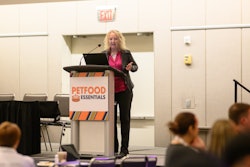
The pet food regulatory system in the U.S. does not meet the needs and challenges of today’s pet food market, according to Dana Brooks, president and CEO of the Pet Food Institute (PFI), who spoke April 30 at Petfood Forum in Kansas City, Missouri.
The Pet Food Uniform Regulatory Reform (PURR) Act (H.R. 7380), which was introduced in the U.S. House of Representatives on February 15, would update and streamline the regulatory system. It would give the U.S. Food and Drug Administration (FDA) regulatory authority over the labeling and ingredient review process for dog and cat food and treats, replacing the outdated and inconsistent state-by-state approach used for ingredient and label approval.
“We looked at everything that we could and the only way we thought that we can simplify this system was legislation to create a more unified framework for pet food regulation,” Brooks said.
Brooks clarified what the PURR Act would and would not do if it became law.
The proposed PURR Act legislation would:
- Amend the Federal Food, Drug and Cosmetic Act
- Pre-empt any state government from requiring label reviews or premarket approval
- Require FDA’s Center for Veterinary Medicine (CVM) to conduct timely science-based reviews of pet food ingredient submissions and submit a yearly report to Congress on performance metrics
- Permit ingredients identified as accepted for use in pet food under Chapter 6 of the American Association of Feed Control Officials (AAFCO) Official Publication to continue to be lawfully used and deemed generally recognized as safe (GRAS)
- Permit current claims, such as “tartar control,” “human grade,” “natural” and others to continue to be used and regulated by FDA CVM
The proposed PURR Act legislation would not:
- Change or affect the Food Safety Modernization Act (FSMA), which already gives FDA the authority to regulated pet food safety
- Affect state safety inspections of facilities under FSMA
- Affect the ability to use the Food Additive Petition (FAP) process, GRAS determination process or the AAFCO ingredient approval process
- Affect state regulation and oversight or the ingredient approval process of commercial feed for livestock and specialty pet food under existing federal and state laws
- Prohibit any cooperative agreements between FDA and states
“If not all states support this at the same time, we’re left in a more difficult environment, and it’s going to cost our industry a billion dollars to make these changes,” Brooks said. “Again, the states don’t approve it all at the same time, then we’re worse off than we are today.”
Brooks said PFI is working to get a companion bill to the PURR Act introduced in the U.S. Senate.


















